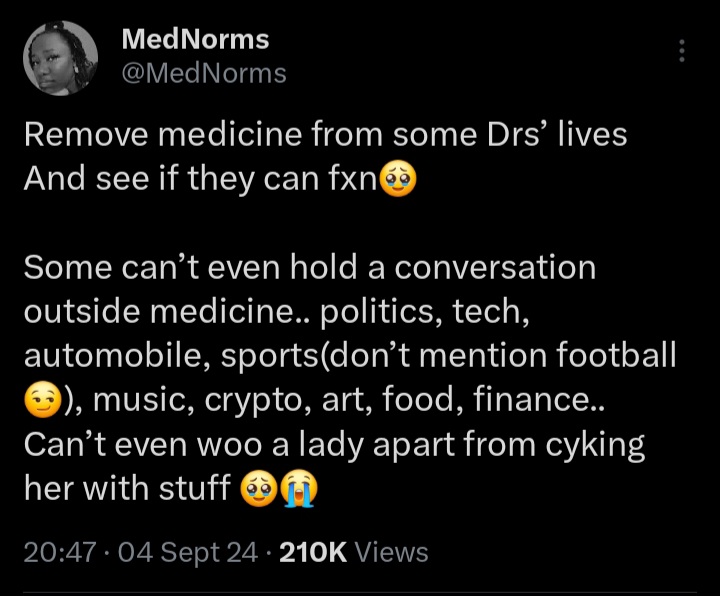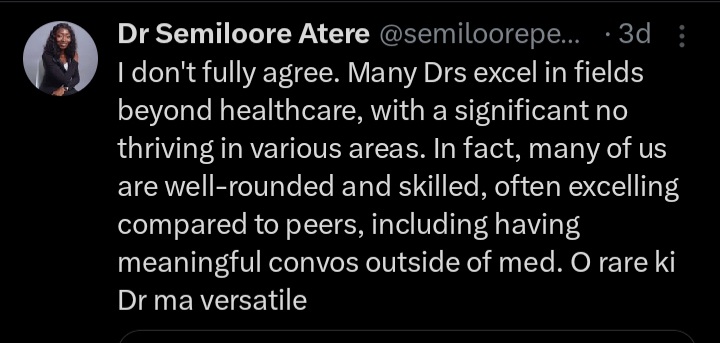In medicine, cross-training involves acquiring skills and knowledge beyond healthcare. A few years ago, almost every family aimed to produce a medical doctor in Nigeria. The chosen child is to go to school, carry a big bag of textbooks, and always bury their head in books.
While this approach often leads to expertise in medicine and clinical practice, it leaves the student less prepared for challenges outside the pages of their textbooks.

Cross-training doesn’t mean abandoning medicine. Rather, I look at it as a way of enhancing medicine, a means of gathering more skills to open new doors of opportunities. In this article, I’ll explore how cross-training can improve patient care and benefit healthcare professionals.

Disclaimer: This article lacks enough statistical data to support my claims. Instead, I will present case scenarios, leaving it to your imagination to fill the gaps.
1. Cross-training Medicine With Leadership Skills
Some individuals have the charisma and knowledge to lead their followers. This trait may stem from their early exposure to leadership roles. Meanwhile, other people have the leadership potential that requires the right opportunities. Medical school offers various opportunities, from student government to leadership roles in organizations. These experiences can help individuals groom their leadership abilities, preparing them to lead well in personal and professional settings.
Case Scenario
Who would you choose as your Minister of Health?
a. A medical doctor with leadership skills.
b. The best surgeon in the country without leadership experience.
c. A political scientist
2. Building Relationships
Medical school is a small world that brings together people from diverse backgrounds and beliefs. The only connection with these people are the shared challenges like classes, postings, and continuous exams. However, it provides an avenue to improve your interpersonal skills by engaging with others.
Aside from your regular classmates, getting involved in associations like the Nigeria Medical Students Association allows you to meet with people from different regions of the country. You can take it a step higher by interacting with medical students from Africa or the world. Working on projects and bringing ideas to life together teaches you to adapt to cultural differences that further improve your relationships.
Relating With Patient
Building strong interpersonal skills through interactions in medical school helps you to better communicate with patients. Learning to appreciate different perspectives and backgrounds makes you more empathetic and better equipped to break down stereotypes. In the long run, you get to improve patient care.
Case Scenario
As a patient, which doctor would you prefer?
a. A doctor who criticizes your choice of clothing because it doesn’t align with their religious beliefs.
b. A doctor who takes their time to discuss aspects of your culture, while making you at ease as they prescribe the necessary treatment.
Relating With Potential Lovers
Interpersonal skills developed through medical school interactions can also help in your romantic life. Effective communication is key to creating lasting connections, whether building a romantic relationship or maintaining one.

Case Scenario
As a partner, who would you prefer to be in a relationship with?
a. A partner whose idea of a first date is a endless discussion of medical jargon and complex topics.
b. A partner who makes you feel butterflies, leaving you grateful for such an engaging conversation.
You cannot be moving stuff on a date!
3. Cross-training Medicine and Business
Running a business during medical school is only a path for some. But those who succeed in this business often gain valuable experience. This experience can be fruther utilised in the medical field.
Case Scenario
You want to start a skincare journey. Who would you choose?
a. A certified dermatologist with a dermatology centre where you can get professional consultations and conveniently purchase your skincare products.
b. A self-taught skincare expert who excels in sales but lacks medical knowledge
4. Creativity
I have a theory about creativity: your creative space is your safe zone. Exploring your creative side, like writing, painting, singing, photography, and even modelling, is a beautiful way of distracting yourself from the rigours of med school.
Luckily, some medical student associations have clubs that promote creativity. Knowing what you love aside from medicine and using it to escape is a way of learning about coping mechanisms.
P.S.: Your creativity can also help you make money.
5. Technology
Tech is the future, and its role in healthcare cannot be overemphasized. From medical devices to virtual reality practice sessions, if you’re a medical student passionate about tech, you can make a difference. New medical equipment and software can bridge the gap between medicine and patient care. Your innovations could improve treatments, patient experiences, and a more efficient healthcare system.
Conclusion

As a medical student, you’ll have the chance to explore different areas of interest. But to do well, you’ll need to figure out how to juggle them without letting medicine fall off the equation. The idea of balance might sound nice, but it’s only an illusion. You will often have to choose between medicine and other things you care about, depending on which needs your focus the most.



Leave a Reply